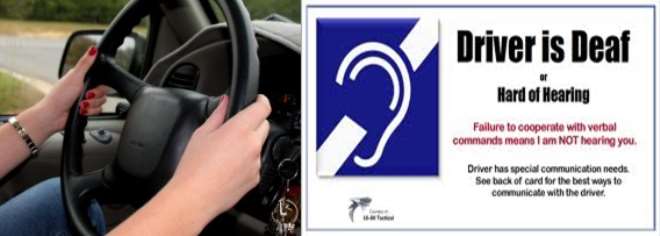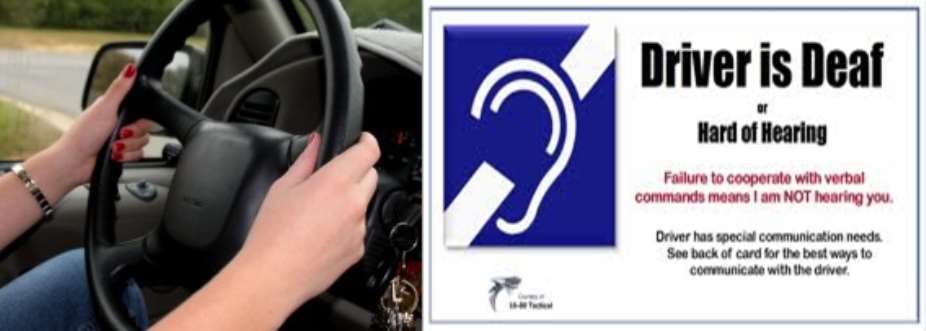If Deaf people can't hear, how can they drive? Plus, find out which countries allow Deaf people to drive and which countries still deny Deaf people this fundamental right.
An Important Right
The right to drive is not a trivial one—without it, Deaf people are be restricted in their ability to work and to access medical, community, and other services. The Deaf community has had to fight for this important right. In the United States in the 1920s, when states were adopting their first motor vehicle laws, several states enacted laws denying Deaf people the right to obtain drivers licenses. By educating hearing people that Deaf drivers posed no threat to public safety, the National Association of the Deaf and its state committees were able to win the repeal of these discriminatory laws.5
While Deaf people in all 50 U.S. states have the right to drive, they still face discrimination in some aspects of driving. For example, until 2006, UPS refused to hire deaf drivers because of safety concerns, which a federal court eventually ruled to be unfounded.6 In addition, some Deaf people have reported being denied the ability to rent or test drive a car. Others find that if they do become involved in an accident, it can be harder to prove they weren't at fault since many hearing people make the assumption that Deaf people can't drive safely.7
Deaf Drivers and Safety
Many people wonder how a Deaf person can drive without being able to hear audible cues such as a police siren, an ambulance needing the right of way, or even a honking horn. There are several was around this problem. First, some Deaf people use electronic devices in their cars that alert them, using a lighted panel, to sounds coming from outside the vehicle.1 Others simply pay attention to visual cues, such as the flashing lights of an emergency vehicle or cues from other drivers on the road. For instance, noticing other drivers move to the side of the road is a strong indicator that an emergency vehicle is approaching.
Hearing people might also wonder how a Deaf person would communicate with a police officer if pulled over. In the United States, some Deaf drivers carry state-issued cards to let police officers know that they are Deaf and to suggest ways to communicate, such as by writing in a notebook. Many Deaf people find the cards unnecessary, especially if they're able to lip read well.2
“But, ultimately, isn't it just unsafe if a driver can't hear what's happening outside the vehicle?” Actually, studies show that Deaf drivers are no more likely to be involved in car accidents than hearing drivers.3 This makes sense since driving is mainly a visual activity. Plus, there's even some research to suggest that Deaf adults have better peripheral vision than hearing people4, surely an advantage when driving.
Deaf people in Japan, who won the right to drive in 2008, must display this butterfly sticker on the back of their vehicles.
Source: Public Domain via Wikimedia Commons
Fighting for the Right to Drive Worldwide
In a 2009 report, the World Federation of the Deaf (WFD) found that out of 93 national Deaf organizations surveyed, 31 indicated that Deaf people are not allowed to obtain a driver's license in their country.8 A number of the 93 countries surveyed did not respond to the questionnaire—not to mention the fact that there are nearly 200 countries in the world in total-- making it unclear exactly how many countries deny Deaf people the right to drive.
An earlier WFD report, citing 26 respondents who indicated that Deaf people are not allowed to drive in their country, is often misinterpreted to mean that “all but 26 countries in the world” allow Deaf people to drive. It is important to note that this is not correct, and the actual number may be substantially higher.
The tables below indicate where Deaf people have the right to obtain driver's licenses worldwide. There are many countries for which information is not available.. While much progress has been made, particularly in recent years, there is still much work to be done to ensure this basic right for Deaf people around the world.
Countries Allowing Deaf People to Obtain a Driver's License are;
Region Countries Source(s)
Africa: Eastern and Southern Botswana, Kenya, Lesotho, Madagascar, Namibia, Seychelles, South Africa, Swaziland, Tanzania, Uganda, Zimbabwe World Federation of the Deaf, Regional Report No 5, pg 68 (2008); DOOR International (Kenya, 2010)
Africa: Western and Central Burkina Faso, Cameroon, DR Congo, Côte d'Ivoire, Gambia, Ghana, Guinea, Nigeria, Sierra Leone World Federation of the Deaf, Regional Report No 6, pg 59 (2008)
Arab Region Algeria, Bahrain, Iraq, Kuwait, Lebanon, Oman, Palestine, Qatar, Saudi Arabia, Tunisia World Federation of the Deaf, Regional Report No 7, pg 55 (2008)
Asia and Pacific Australia, Bhutan, Cambodia, Indonesia, India, Japan, Malaysia, Nepal (2012), New Zealand, Philippines, Republic of Korea, Sri Lanka, Thailand World Federation of the Deaf, Regional Report No 2, pg 61 (2008); Legal India (2011); ITN news broadcast (Sri Lanka, 2012); The Himalayan Times (Nepal, 2012)
Eastern Europe and Middle Asia Republic of Belarus, Bulgaria, Republic of Kazakhstan, Republic of Moldova, Russian Federation, Republic of Uzbekistan World Federation of the Deaf, Regional Report No 1, pg 49 (2008)
European Union All countries World Federation of the Deaf, "WFD Statement on Deaf People's Right to Drive a Car or Other Vehicles." (2009)
North America, Central America, and the Caribbean Canada, Costa Rica, Cuba, Dominican Republic, Ecuador, El Salvador, Guatemala, Guyana, Honduras, Jamaica, Mexico, Panama, Suriname, USA World Federation of the Deaf, Regional Report No 4, pg 55 (2008); alldeaf.com participant (Ecuador, 2010); The Gleaner (Jamaica, 2010)
South America Argentina, Brazil, Chile, Colombia, Peru, Venezuela World Federation of the Deaf, Regional Report No 3, pg 49 (2008)
Countries Not Allowing Deaf People to Obtain a Driver's License
Region Countries Source
Africa: Eastern and Southern Burundi, Ethiopia, Eritrea, Malawi, Mozambique, Rwanda, Sudan, Zambia* Word Federation for the Deaf, Regional Report No 5, pg 68 (2008); Keycorrespondents.org (Zambia, 2012)
Africa: Western and Central Benin, Cape Verde, Chad, Gabon, Niger, Senegal, Togo World Federation of the Deaf, Regional Report No 6, pg 59 (2008)
Arab Region Egypt, Mauritania, Morocco, United Arab Emirates, Yemen World Federation of the Deaf, Regional Report No 7, pg 55 (2008)
Asia and Pacific Laos World Federation of the Deaf, Regional Report No 2, pg 61 (2008)
Eastern Europe and Middle Asia Republic of Armenia, Ukraine World Federation of the Deaf, Regional Report No 1, pg 49 (2008)
Mexico, Central America, and the Caribbean Haiti, Nicaragua World Federation of the Deaf, Regional Report No 4, pg 55 (2008)
South America Bolivia, Ecuador, Paraguay World Federation of the Deaf, Regional Report No 3, pg 49 (2008
Research By:
Alhaji Alhasan Abdulai
EXECUTIVE DIRECTOR
EANFOWORLD FOR SUSTAINABLE DEVELOPMENT
ALHAJI A ABDULAI [email protected] /[email protected] 233 20 8844791 /
 2014-09-08 214541
2014-09-08 214541





 Chairman Kingsley Owusu Brobbey calls for Privatization of Electricity
Chairman Kingsley Owusu Brobbey calls for Privatization of Electricity
 Train accident: Four more grabbed and remanded
Train accident: Four more grabbed and remanded
 Gov't to consolidate cash waterfall revenue collection accounts
Gov't to consolidate cash waterfall revenue collection accounts
 Gov't to settle lump sum for retired teachers by April 27
Gov't to settle lump sum for retired teachers by April 27
 Former PPA CEO granted GH₵4million bail
Former PPA CEO granted GH₵4million bail
 Dumsor: The darkness has exposed you; you’ll go down as the worst in Ghana’s his...
Dumsor: The darkness has exposed you; you’ll go down as the worst in Ghana’s his...
 Dumsor: The ‘incompetent’ person provided a timetable whiles those who came to s...
Dumsor: The ‘incompetent’ person provided a timetable whiles those who came to s...
 Defend, ensure NPP’s good works are ‘sold’ and highlight the ‘bad’ state of the ...
Defend, ensure NPP’s good works are ‘sold’ and highlight the ‘bad’ state of the ...
 Bawumia will rank high ahead of Mahama in any anti-corruption test — Salam Musta...
Bawumia will rank high ahead of Mahama in any anti-corruption test — Salam Musta...
 NPP trying to bribe us but we‘ll not trade our integrity on the altar of corrupt...
NPP trying to bribe us but we‘ll not trade our integrity on the altar of corrupt...
